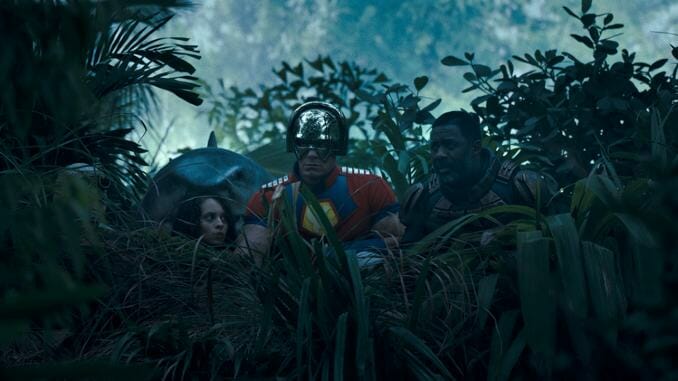The Suicide Squad Once Again Proves James Gunn’s Command of Comic Chaos

How is James Gunn one of the only people that actually seems to know how to make a comic book movie feel like it was built out of a comic book? Sure, the excellent Spider-Man: Into the Spider-Verse did it, but it took making one of the most impressive animated movies in years. Writer/director Gunn, who’s hopped over to DC after making a pair of Guardians of the Galaxy movies for Marvel, achieves some of the same delirious multimedia fidelity in live-action with The Suicide Squad, his bombastic, silly and self-aware revisionist take on the super-group of screw-ups coerced into jobs too tough, dangerous and/or undesirable for the conventional wetworkers of our humble government.
Gunn’s action has such a clear and confident tone that it can pepper in filmmaking winks—like quick Bourne-like zooms when Task Force X director Amanda Waller (Viola Davis) plays God with the lives of costumed crooks from the safety of her command center—to add a little more visual flavor to its already over-the-top, R-rated, downright enjoyable adaptation.
He achieves this in part through things none of his source comics (mostly taking from John Ostrander’s definitive ‘80s run) could include: Some of the best needle drops in the business, gore like Troma gleefully remade Saving Private Ryan and F-bombs galore. But Gunn’s secret—aside from the fact that he’s the rare filmmaker that’s superhero script credits lack ampersands—is that he’s able to deploy these so effectively because he’s already snuck in the takeaways that made the comics dance in the imaginations of their readers: Bantery team-building; an ability to turn a newcomer fifth-stringer into your new favorite character; inventive chapter titles interspersed over splash page-like frames; and cartoony-yet-competent fights and design work that balances big colors, slick costumes and character VFX to toe the finely-inked line between hilariously overwrought and dramatically tangible. The latter elements were what the majority of the DC films (especially the first on-screen incarnation of the team in question) lacked. Garnishing all that with Gunn’s jokey juvenile flair is just a bonus.
Part of the joke is the sheer quantity of goofball Legion of Doom rejects shoved into the mix. Sure, you’ve got the familiarly chaotic clown-about-town Harley Quinn (Margot Robbie, who’s by now thoroughly made the role her own), Captain Boomerang (Jai Courtney) and straight-laced military man Rick Flag (Joel Kinnaman) alongside the new A-listers (John Cena’s Captain America pastiche, Peacemaker; Idris Elba’s gruff sharpshooter Bloodsport). But there’s a Golden Corral buffet of questionable riffraff introduced as well, including but not limited to: King Shark (Sylvester Stallone, channeling a dumber and hungrier Groot), Polka-Dot Man (David Dastmalchian), Ratcatcher 2 (Daniela Melchior), Blackguard (Pete Davidson) and a human-sized weasel (Sean Gunn). They’re all distinct and most of them are distinctly, joyfully hateable.
And over the course of The Suicide Squad’s solid tropical island action movie—one that’s politics are almost as sharply cynical as its true-to-source treatment of its protagonistic supervillains—Gunn isn’t afraid to dole out the kind of consequences that have mostly been relegated to the fun-poking, franchise-flouting realms of TV superhero meta-critiques like The Boys and Invincible. These aren’t unfamiliar to Suicide Squad readers, but they’re increasingly shocking, strange and bracing (not to mention fun!) to find in AAA studio movies. As the team moves from FUBAR beach operations on Corto Maltese to sabotaging its local lab’s super-science, actual tension develops—a rarity among The Suicide Squad’s contemporaries.
-

-

-

-

-

-

-

-

-

-

-

-

-

-

-

-

-

-

-

-

-

-

-

-

-

-

-

-

-

-

-

-

-

-

-

-

-

-

-

-








































